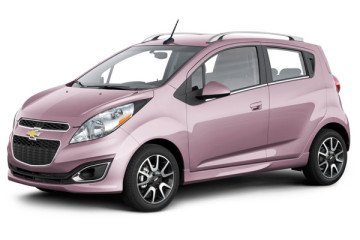Selling Cars to Millennials: Quirky Models, Flashy Colors Aim to Get Gen Y Out of Neutral

Aren’t today’s younger drivers just like their older counterparts, but without the gray hair and memories of life before TiVo? Well, no. The differences run much deeper.
For one thing, millennials tend to be more uncomfortable with haggling than their parents or their older siblings from Gen X. Few consumers actually enjoy dickering over prices, but millennials, who came of age with the rise of price-comparison sites and simple, straightforward point-and-click purchasing via the Web, are especially likely to be turned off by high-pressure negotiations. This is doubly the case because they’re not particularly keen on car ownership in the first place, often feeling more comfortable with using public transportation, car sharing, or perhaps just borrowing their parents’ wheels.
Drawing on new car-buying data from IBM — which is backed up by previous research — the Detroit Free Press reports that members of Gen Y are also more likely than older consumers to have little or no loyalty to a specific automaker brand:
- There is evidence that millennials (consumers between ages 18 and 34) are brand-fickle. They also placed more emphasis on word of mouth from parents and siblings than older Americans.
Likewise, an Advertising Age story about how food companies try to market to millennials describes today’s young consumers as “mercurial and disloyal.” What, then, appeals to them? A Frito-Lay executive points out that products that are “out of the ordinary” have a better chance of becoming hits with millennials, compared with the usual stale old offerings.
Out of the ordinary seems to be appealing to young people in terms of automobiles as well. A CNN Money gallery displays several new small cars that feature colors that are nearly as wild, bright and filled with personality as the spectrum of iPhone covers in a college classroom. Why is it that young drivers are especially drawn to tiny vehicles such as the Ford Fiesta and the Chevy Spark, which is available in colors like Techno Pink and Jalapeno?
First, small cars tend to be purchased by younger people who haven’t yet had the youthful nonconformity crushed out of their souls. (That happens later. Then they buy gray midsize family sedans.)
Second, bright colors tend to look better in small doses. A color that might seem garish on a large car can be tolerable and even fun on a tiny car like the Fiesta.
Also, quite obviously, cars with colors such as these qualify as “out of the ordinary.” So too does Ford’s new nonminivan, the Transit Connect. Despite sliding doors, seating for seven and an overall appearance of, well, a small van, Ford is carefully avoiding the M word when describing the Connect, which will be widely available for sale by the end of 2013.
Ford’s thinking is that the car will appeal to younger drivers who are starting families, so long as it doesn’t have the stigma of being a dorky minivan, according to Reuters:
‘Many of them grew up in the back of a minivan,’ Ford’s head of global engineering Hau Thai-Tang said at a media event.
‘Historically, different cohort groups tend to reject what they’re familiar with,’ Thai-Tang added. ‘We think that’s another reason a product like this would be appealing to them.’
Toyota, meanwhile, is trying out a very different approach to draw attention to its Scion brand — a brand that, by the way, has plenty of small cars with offbeat colors (Hot Lava? Black Currant?), like the tiny iQ. As USA Today described, the new Scion Motivate program is welcoming entrepreneurial-minded consumers ages 18 to 35 to explain their career goals in an application for the contest, with the winner getting $10,000, a personal business mentor and a brand-new Scion:
‘Scion’s customers have long been among the youngest in the industry, but many are also characteristically self-starters with strong interest in pursuing their passions,’ said Scion Vice President Doug Murtha. ‘Drawing on the unique strengths of our creative communities and Scion’s commitment to the arts, we designed a powerful way to support young entrepreneurs in pursuing their dreams. We hope to inspire young leaders to seize the day and succeed.’
Naturally, organizers also hope the contest places the out-of-the-ordinary Scion brand in a favorable light with today’s young consumers — disloyal though they may be.
Related News


